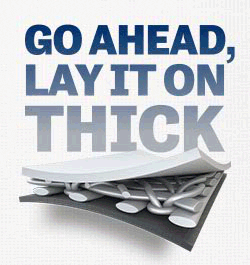Ethics, Personal And Business
« Back To Roofers TalkOh, why wait till later to start this ball rolling.....
On another topic, the subject of Ethics came up.
Does a person need a course and guidance to know and do what is ethical?
Or, is the morality of one's upbringing and past experiences the definition of the man/woman?
If a person with suspect ethics to begin with were to take a course in ethics and pass with flying colors, does that automatically make the man a person of moral and ethical platitude?
Just to sort of start it off, my take on this, is doing what needs to be done, when the temptation to choose a different path is readily available, when no one else is looking or aware of the inner resultant decision being played out in your mind.
Politicians and certified organizations have Codes Of Ethics.
Are these COE just a road map for guidance, subjectively available for modification as one justifies it?
When making such ethical adjustments and they are rationalized as still being the right thing to do, is it just that it is right for you and your priorities or is it the right thing that any outsider looking in would also conclude?
What burden should be placed on both the contractor and the consumer regarding a prescribed Standard of Ethics?
The industry wide reputation of contractors in general seems to be clouded with the more blighted viewpoint. Yet, there are all too many voices raised by contractors too, that they are being misaligned and mistreated when it comes to decisions of fair dealings that need to be arbitrated or adjudicated.
What opportunities exist as a united front, can any small group of vocal contractors take, to swing the scales of balance to a more equal footing?
Ed
>>>
Internally implode as I see it. In another country what we do in the area of law morality and ethics are looked at completely different. As weird and wrong as I look upon with contempt , distaste Sharia Law. They look upon our Christian constitution , bill of rights republic form of government, in a very different way than most of us. Very interesting .The Crusades might come to mind . I'm trying to figure out if this makes any sense the way it written.>>>
WELL SAID Miscreant!!>>>
Sometimes I see people confusing ethics with honesty. Other times I see businesses declaring what is ethical(which in itself may be unethical).
Here's a real world example: If a roofer tells a customer that felt will be installed when they do the roof job and then doesn't install felt, that is dishonest. If a roofer tells a customer they could save money by not installing felt, it then becomes an ethical question. Those questions are best resolved by a group of the roofing industry's best and brightest. Your actions are then judged ethical or unethical by the standards of that group. You are free not to align yourself with that group.
In the roofing business we don't have traditional ethical standards because we are all too independent. If we all agreed on something we would probably internally combust.>>>
CIAK Said: Jed Would you say humans are born good or evil ( bad )?
Rite off the top of my head i can't quote you scripture and verse rite now Chuck , but somewhere in the Bible it says we come from our mothers womb speaking lies.>>>
Jed Would you say humans are born good or evil ( bad )?>>>
Absent the belief of our accountability to God, we become a law unto ourselves. I believe that, as the Bible teaches, we are sinful by nature. Therefore, we do not instinctively know right from wrong.
"The presence of law is usually the sign of absence of moral behavior."
"Having a moral code that is objective and consistent is necessary for such a system to work. Should each person have the ability to define his or her own "code", order completely falls apart."
Mike Huckabee from Do The Right Thing
We only need witness the recent shenanigans on Wall Street . . . . . .
I do agree that many times a code of ethics is merely a "warm fuzzy" for the consumer. >>>
I think we instinctively know the difference between right and wrong and codes of ethics are fluff. There are many dos and donts and we discuss the grey areas as best we can when the situationa rises or is anticipated ie WWYD? I applaud Mr Moffet and his heroics but believe the officer did the right thing too. Had he not been issued a ticket the driver of the vehicle may have been found to be at fault when he may not be.>>>
Mike, you wrote:
"Government writes laws to define ethical conduct. Government is filled with some of our nations most vile offenders. Lawyers earn their living defending those that break it, and figuring out how to skirt it. Is a Code of Ethics, or a class thereon, of any significant difference?
Those that care will do what's right for reasons within themselves. Those that don't care will make decisions based on dollars alone.
A class won't change it."
I would argue that the government writes laws to define "lawful" conduct, which may or may not actually be ethical. I agree with the rest of your statement. Your last sentence makes me wonder if ethics CAN be taught? Or is it more a case of bring out the latent abilities through appropriate nurturing?>>>
Don't know if "ethical" is appropriate usage here. The jaywalking bylaws are on the books because more people get hurt while jaywalking, than when crossing at the crosswalks. The tickets are there to ensure that people who are tempted to cross in a place other than a crosswalk are dissuaded from doing so. Trooper Sullivan may be within the letter of the law in issuing the ticket, but he sure is outside the spirit of the law. So I would say that his issuing the ticket was an example of lack of common sense, or too much bureaucatitis, as issuing the ticket will have no dissuadive effect on Mr. Moffat helping elderly women.
On the britannica storey, the software writers should consider Issac Asimov's "Three laws of Robotics". Of course, the loop-hole there is the definition of "human" has been rather flexible over the years, with slaves, children and women all being considered "non-human" under the laws at various places and times. The eugenics movement championed a rather narrow definition.
And while we're pondering ethics, consider:
Is it ethical to help someone commit suicide if that person is terminally ill and in great pain?
Is it ethical for a soldier to kill another person?
If you could save only one of two people, is it ethical for you to make the choice?
Is it ethical for a person to disobey a law if they are personally convinced that the law is wrong?
Is it ethical to look the other way when one knows a wrong is being committed?>>>
Here is an interesting story concerning this topic. Was it ethical for the officer to issue the ticket ? DENVER – A good Samaritan who helped push three people out of the path of a pickup truck before being struck and injured has gotten a strange reward for his good deed: A jaywalking ticket.
Family members said 58-year-old bus driver Jim Moffett and another man were helping two elderly women cross a busy Denver street in a snowstorm when he was hit Friday night.
Moffett suffered bleeding in the brain, broken bones, a dislocated shoulder and a possible ruptured spleen. He was in serious but stable condition Wednesday.
The Colorado State Patrol issued the citation. Trooper Ryan Sullivan said that despite Moffett's intentions, jaywalking contributed to the accident.
Moffett had been driving his bus when the two women got off. In the interest of safety, he got out and, together with another passenger, helped the ladies cross.
Moffett's stepson, Ken McDonald, said the driver of the pickup plowed into his stepfather, but not before Moffett pushed the two women out of the way.
When he awoke in intensive care, he learned of the ticket. "His reaction was dazed and confused. I was a little angry," said McDonald.
The other man also was cited for jaywalking, while the pickup driver was cited with careless driving that led to injury. Sullivan said the two elderly women haven't been cited but the investigation is ongoing. This an interesting story http://www.britannica.com/blogs/2009/02/the-artificial-morality-of-the-robot-warrior/ >>>
Here's what my grandfather told me:
A business deal is when two people bargain with each other such that each gets something they want. If only one person gets what they want, that is something else ... that is one person taking advantage of another person.
Beyond that, I can't help you.>>>
JMO but anyone who needs a "course" in ethics or a religion as an excuse (or crutch) for poor morality decisions needs more than I can offer them. You're either a good person or a bad one and if you don't know the difference, again, I can't help you.
JET>>>
Government writes laws to define ethical conduct. Government is filled with some of our nations most vile offenders. Lawyers earn their living defending those that break it, and figuring out how to skirt it. Is a Code of Ethics, or a class thereon, of any significant difference?
Those that care will do what's right for reasons within themselves. Those that don't care will make decisions based on dollars alone.
A class won't change it.>>>
So then, what is the purpose of Any organization to even spout out about their distinguishable Code Of Ethics?
As you stated Paul, those that must proclaim loudest how they are superior in their moral fiber than the others give a tell-tale advertisement about themselves. Why do certifications then seem to have any merit at all?
I'll try to answer my own question.
At least it gives an individual or a group a bar to strive towards. Without outside influence, grown, nurtured and fully developed in an isolated vacuum from outside opinions, any level of self satisfaction and achievement aspiring towards a self proclamation of goal achievement would put that bar wherever that individual or group chooses to set it at.
So, lets not just look upon any particularly articulated Code, per se, but at what defines any one individual or organization as being an ethical entity.
Let's look at a few points that Ciak brought up: Violating laws or regulations enacted by a government whose authority has been established by law. Now this begs another question . If it is legal does that make it ethical or moral ? Is willfully misrepresenting or concealing a material fact in business if it is an insurance or contracting , or any business dealing.. in violation of a duty or obligation unethical. Why would aiding and abetting in the performance of any unethical practice be a problem ? Is it unethical to breach the confidential relationship with a client or with his principal. How would you handle it if it was illegal but still ethical in with your ethics or morality ?
In particular, the first sentence and it's points, I find to be very seemingly on mark, but would they be, really?
Does an established law, policy or any other such guideline determine how I, as an individual, should caste my opinion and blaze my own trail in life? Fluidity occurs way too often in laws and regulations to be the unifying guiding source. All those propositions provide, is that a certain vocal public or private voice has hammered their own viewpoints home diligently enough to enact their own ideology onto others, who for whatever reasoning, decline to speak out and against undesirable directives.
So then, just because a semblance of the surrounding cast of characters has enacted some policy for direction, that does bear directly upon whether or not, those that choose to follow those guidelines are acting ethically, now does it?
What if one were to say, well it just didn't feel right? Is that the shining beam towards a proper direction? I think that personal feelings are way too emotionally influenced by previous behavioral training in that individuals own vacuum to merit it worthy of true stand alone substance.
What about intelligence? Does a superior intellect imply a greater or lesser chance at success or failure? Does the innocent babe, who knows nothing about right or wrong yet, possess more aptitude towards ethics than a fully developed and nurtured adult? Conversely, does an extreme amount of intelligence belie that there may be more moral perversions and excuses to be self sustained, that they are entitled to be of a different character than the more common mold of other men?
How about Religions? Most, in their own mind and way of thinking, seem to be convinced that they uniquely strive for a higher ethical plateau than all of the others, so then, it would depend upon which side of the fence you were located in that comparison. What is ethical to one, would be caste in shame or at least doubt by another.
How about the law? Who's law? From which time period? Was slavery not once considered acceptable in this country, at least in part? Since we have our time machine, then why is our now current national stance on that not subject to criticism by those that still find that multi-level humanistic categorization to be an acceptable part of their culture? Or is it, but we do not hear the cries, due to silencing
The fact that someone ascribes superiority to themselves because of a written "code of ethics" is as valid as someone claiming their marriage is solid and good because of the words on their marriage license. In fact, the more someone talks to me of their honesty and ethics, the more red flags get waved in my mind. You know the drill. If someone starts using the word "honestly" every other sentence, it really implies to me that they are lying. If their statements were really honest, it would not be necessary to sell me on that by using the word.
Ed, you are referring to organizations that need to distinguish themselves from everyone else. Frankly, I couldn't care less if a member of such an organization had a code of ethics or a secret handshake. I WOULD care about whether that member was reliable, knowledgeable, and honest, but I would get that information from others who know the member and/or used his services. The fact that they "belong" tells me only that they paid money (dues) to be called a member. It's a form of laziness on the part of the consumer or user of services to rely on the "approval" or "authorization" or "official" designation as any indicator of quality. Buyer Beware.
Even if one is a member of an order (professional or religious), where rigorous vetting and training distinguish those who belong from everyone else, that is not a guarantee of anything. We all know of too many situations where the esteemed doctor was a quack, or a revered minister had feet of clay, or a renown public servant was determined to be an amoral opportunitist. Even if we look upon ourselves, how many can claim not to have done anything unethical? We are human, and as humans we fail often. The thing that distinguishes the really "good" people from the less good, is that the good ones fail slightly less often.
Are profitable contractors more or less ethical than those losing money? I can't make the relationship between profit and ethics. There are unethical profitable contractors that "earn" their money by cutting corners, just as there are ethical profitable contractors that earn their money because they are smart, efficient and well organized. There are also lots of ethical tradesmen going broke because they don't know basic business concepts.
There are many models of how to make money. A monopoly tends to be artificially-constructed and designed to keep prices high by limiting product or access. On the other hand, you could have a product or service in high enough demand that the suppliers can't meet the demand, therefore buyers bid up the price to assure themselves of access. Profit itself is ethically-neutral, it's the manner in which it's made that determines if it was ethically, or fraudulently obtained.>>>

























